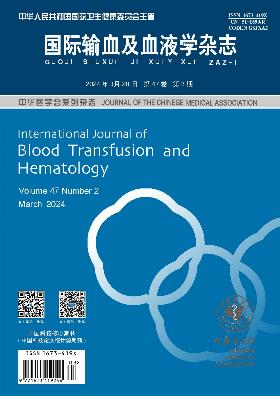Basis of CD7 molecule and its research progress on immunotherapy in hematologic malignant diseases
引用次数: 0
Abstract
CD7 molecule is a 40 kDa single-chain glycoprotein molecule, belonging to the immunoglobulin superfamily. It is an important surface marker on the human immune cell membrane and plays a role in synergistic stimulation of molecular receptors during lymphocyte development and maturation. As an abnormal marker on the surface of hematological malignant cells, it is highly expressed in acute T-lymphocytic leukemia(T-ALL)and T-cell lymphoma. About 30% of patients with acute myeloid leukemia(AML) have been detected the expression of CD7 antigen in tumor cells. CD7 molecule is thought to be involved with disease invasiveness, drug resistance, and poor prognosis. Potent chemotherapy, immunotherapy, hematopoietic stem cell transplantation(HSCT) and other programs have achieved very significant results in the treatment of hematologic malignant diseases. Despite this, there are still some cases of acquired treatment tolerance during the treatment. Molecular targeted therapy provides a safe, effective, and specific therapy regimen that has received increasing attention in recent years. Using of CD7 molecular as a new target for molecular targeted anti-tumor therapy may provide a new therapeutic direction for CD7-positive relapse or refractory hematological malignant diseases. The article intends to review the current progress in the basic and clinical research of CD7 molecules. Key words: Antigens, CD7; Hematologic neoplasms; Immunotherapy; Molecular targeted therapy; Chimeric antigen receptorCD7分子的基础及其在血液恶性疾病免疫治疗中的研究进展
CD7分子是一种40kDa的单链糖蛋白分子,属于免疫球蛋白超家族。它是人体免疫细胞膜上的一种重要表面标志物,在淋巴细胞发育和成熟过程中对分子受体起协同刺激作用。作为血液系统恶性细胞表面的异常标志物,它在急性T淋巴细胞白血病(T-ALL)和T细胞淋巴瘤中高度表达。约30%的急性髓系白血病(AML)患者已在肿瘤细胞中检测到CD7抗原的表达。CD7分子被认为与疾病的侵袭性、耐药性和不良预后有关。强效化疗、免疫治疗、造血干细胞移植(HSCT)等项目在治疗血液系统恶性疾病方面取得了非常显著的效果。尽管如此,在治疗过程中仍有一些获得性治疗耐受的病例。分子靶向治疗提供了一种安全、有效和特异的治疗方案,近年来受到越来越多的关注。利用CD7分子作为分子靶向抗肿瘤治疗的新靶点,可以为CD7阳性复发或难治性血液系统恶性疾病提供新的治疗方向。本文就CD7分子的基础和临床研究进展作一综述。关键词:抗原,CD7;血液肿瘤;免疫治疗;分子靶向治疗;嵌合抗原受体
本文章由计算机程序翻译,如有差异,请以英文原文为准。
求助全文
约1分钟内获得全文
求助全文
来源期刊
自引率
0.00%
发文量
10610
期刊介绍:
The International Journal of Transfusion and Hematology was founded in September 1978. It is a comprehensive academic journal in the field of transfusion and hematology, supervised by the National Health Commission and co-sponsored by the Chinese Medical Association, West China Second Hospital of Sichuan University, and the Institute of Transfusion Medicine of the Chinese Academy of Medical Sciences. The journal is a comprehensive academic journal that combines the basic and clinical aspects of transfusion and hematology and is publicly distributed at home and abroad. The International Journal of Transfusion and Hematology mainly reports on the basic and clinical scientific research results and progress in the field of transfusion and hematology, new experiences, new methods, and new technologies in clinical diagnosis and treatment, introduces domestic and foreign research trends, conducts academic exchanges, and promotes the development of basic and clinical research in the field of transfusion and hematology.

 求助内容:
求助内容: 应助结果提醒方式:
应助结果提醒方式:


